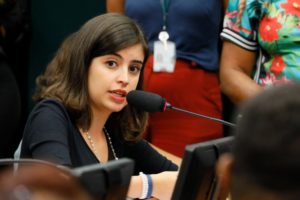Lack of access to the internet increases the differences between public and private school students during the pandemic
By Ediane Tiago*
“The best public policy is one that we are able to implement”, commented Tabata Amaral, federal congresswoman by São Paulo State, in an episode of Brazilian Women in Economics’s podcast. According to Tabata, fundamental projects for Education face a search for perfection, revealing a notorious distance from reality on the part of academics and politicians. “Politics is about to conciliate interests, and not always the best project, in the technical point of view, will be the winner”, she said.

Tabata’s argument represents the challenges that have been faced by Brazil – since the privatization of telecommunications, in 1998 – to validate the Telecommunications General Law (LGT). The legal landmark of the sector balances the competition between the exploitation of services and universalization of access, ensuring free enterprise and isonomy for citizens at the same time. In this context, distance learning should be a tool available for all Brazilians, minimizing the effects of the Covid-19 pandemic in private and public schools calendar.
However, the pandemic has highlighted digital inequality. “Schools should have been connected a long time ago”, reminders Tabata. The congresswoman emphasizes the professors’ effort to adapt themselves to digital learning media, the lack of tools for online classes, and the access difficulties for students.
According to data from the National Telecommunication Agency (Anatel), there are 31,7 million landlines connected to the internet in the country. Landline broadband has 33,3 million accesses, whereas mobile telephony has 225,3 million – demonstrating that Brazilian people have developed their technology habits in adopting access to voice services and data through mobile devices.
The competition and coverage have advanced, but universal access to broadband is a real challenge. On the side of consumers, the speed internet connection required for remote work and distance learning depends on the purchase of a service package that doesn’t fit in the Brazilians’ income. According to Anatel, almost 40% of the domiciles of the country are still without internet access. In low-income families, this percentage increases to 70%.
It is necessary to remain that LGT was written before the explosion of the internet and mobile telephony. The law had a focus on the switched landline. In this context, the bases for guarantee access to the internet – as the creation of Telecommunication Services for Universalization Foundation (Fust) – fell into disuse because of an outdated and low demand service.
The Program Broadband in the Schools (PBLE) isn’t new, too. It was created in April 2008 by the federal government as an objective to connect schools until 2025. It goes ahead slowly e has its own dilemma: connect schools to the internet is just a part of the equation. It is necessary to train professors and to provide distance learning tools, just as facilities for the students.
The answer, according to Tabata, could be in the use of Fust resources to further education through digitalization.
“The educational inequality have increased and the resumption will demand organization and resources for systems learning, mainly in smaller and father cities”, Tabata said.
Nowadays the Fust accumulate almost R$ 22 billion e have been suited as a resource to balance the accounts of the federal government. At the end of last year, the House of Representatives sent the bill to the Senate that allows the use of resources of Fust to expand the broadband in the schools. The bill waits for a vote.
Also in the last year, Anatel itself created a draft bill that becomes possible the utilization of the resources of Fust in projects of public concern. The proposal serves to the recommendations of the Federal Court of Auditors, assisting, especially, the low-income families.
The new Fundeb
Still talking about Education, Tabata also highlighted the importance of the Basic Education Fund for Maintenance and Development (Fundeb), which entered into force in 2007 e today funds more than half of the resources for basic education in the country. “It is necessary to approve the new Fundeb urgently”, she warns. The total annual budget is R$ 150 billion and if it wasn’t renewed, will end at the end of 2020, compromising the primary and secondary school levels.
*Ediane Tiago is a journalist specialized in science, technology, and innovation. She is also a Brazilian Women in Economics’s collaborator.
![EconomistAs [Brazilian Women in Economics]](https://bwe.fea.usp.br/wp-content/uploads/sites/834/2020/11/cropped-logoeconomistas-1-1.jpg)